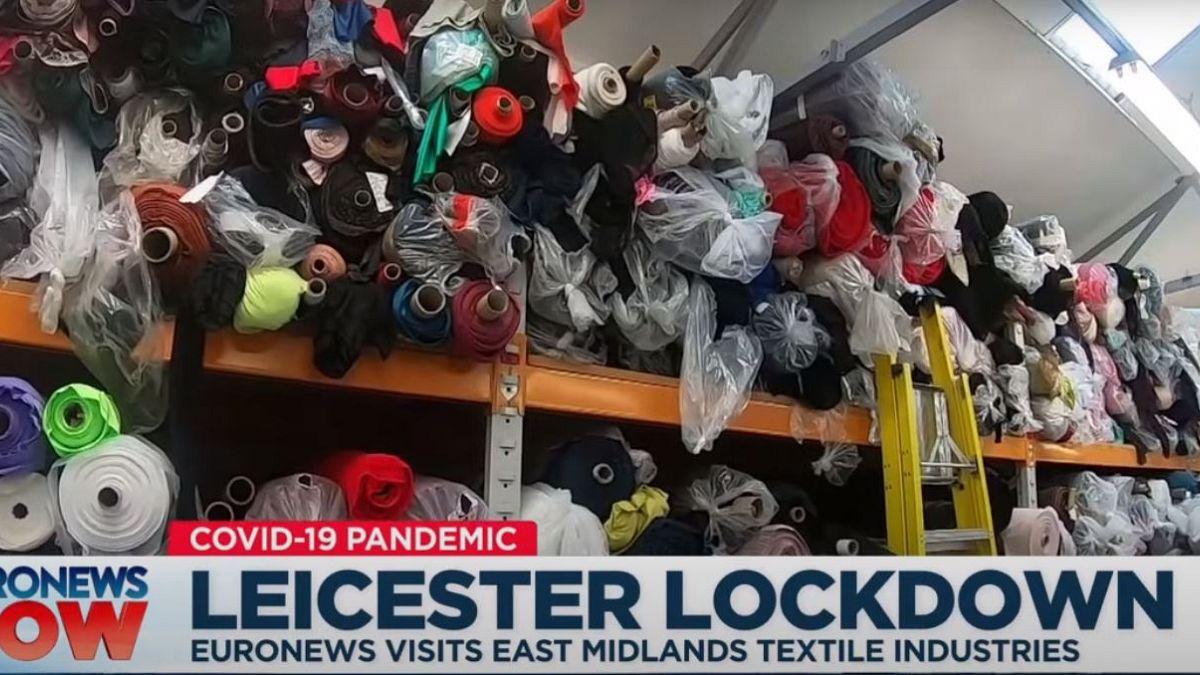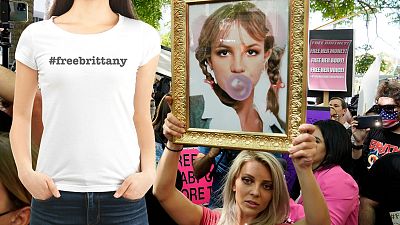Fast fashion and a lockdown boom in online shopping have exacerbated poor working conditions in Leicester and could have helped fuel a local spike in COVID-19 cases.
Fast fashion and a lockdown boom in online ordering has exacerbated poor working conditions at a UK factory and could have helped fuel a local spike in COVID-19 cases, it has been claimed.
The organisation Labour Behind The Label (LBTL) says a company which supplies online retail giant Boohoo has been found to be exploiting workers, paying illegal wages and failing to safeguard its employees against COVID-19.
Workers told Euronews that the factories have not been made COVID safe: "it was as normal as before [coronavirus]. No gloves, no masks, no social distance, nothing at all," says Nick Sakhizadah, a textile factory worker.
During an interview with our correspondent, some of the factory owners attempted to intimidate Sakhizadah and the other workers for "telling the truth", which he says is part of the problem.
Number of illegal workers could be in their “tens of thousands”
Colin Whyatt, regional organiser for trade union GMB in Leicester, believes around two thousand factories employ illegal workers which he says could mean tens of thousands of illegal employees who are vulnerable to trafficking and modern slavery.
Whyatt added that at an ethical trade conference he attended four years ago, auditors admitted to turning a blind eye to these poor conditions because of a loss in revenue if the factory was forced to close.
Leicester East MP Claudia Webbe told Euronews that the government could have stepped in earlier. She says: "I just wonder, if this was a different community whether help would have been provided much sooner so that workers weren't exploited in this way".
Why has this happened?
Demand for 'fast fashion'
The campaign group say Boohoo accounts for 80 per cent of Leicester's capacity and they have for years set garment producers in competition against each other to drive prices down.
LBTL found a very recent order from Boohoo for 1 million pairs of cycling shorts to be produced in Leicester for £1.80 per pair (unit) including packaging, labelling, factory overheads, labour costs and delivery. These shorts have been reportedly sold on Boohoo and its sister site Pretty Little thing for between £3-£10.
At the same time, Sakhizadah says he has been paid considerably less than minimum wage during lockdown. He says: "I'm working for free and taking this big risk".
Megan Lewis from LBTL says: "Brands like Boohoo make a huge profit by pushing prices as low as they can, and this is why they have allowed the situation to go on like this.”
She adds: "For too long, brands have distanced themselves from their suppliers, when they know that exploitation is an inevitable outcome from their poor purchasing practices demanding low prices and fast production times.”
Where are the trade unions in this?
Susan Harris, Director of Legal Services at GMB, says it is not compulsory for an employer to admit a trade union into the premises. In addition, Harris says there is often mistrust and a reluctance from workers in this industry to join a trade union:
“If people were encouraged to join unions, if we had the right to visit workplaces and have access to workers to question if there was any failure by the employer to comply with legislation - whether that relates to Health and Safety, wages etc - then this type of exploitation would be reduced or eliminated.”
Vulnerable workers
Data from the campaign group details that around a third (33.6%) of workers in Leicester's garment industry are born outside of the UK and most of the workers come from minority backgrounds.
Workers who are not born in the UK are more vulnerable to abuse and exploitation due to their immigration status or language skills.
"If people don't know their rights, they don't know that they can complain or know how to complain. And if you then factor into that lack of knowledge with the fact that many of these workers will not have English as their mother tongue then the conditions exist for unscrupulous people to exploit workers," outlines Harris.
“We need better legislation and regulation within the industry and the government must step up to make these changes," says Lewis from LBTL. "The government must also take responsibility for the wider economic and racial inequalities that leave workers vulnerable to such exploitative labour."
LBTL are now calling on Boohoo to commit to transparency and to take more responsibility of their supply chain.
"Boohoo must commit to paying living wages for all workers in their supply chain and crucially, they should commit to supply chain transparency. Other brands have published lists of factories and workshops where their clothes are made, and Boohoo must do this too.”



